Man Yells At Wife For Risking Her Life In Order To Save Their Cat From A Tree
Cats are one of, if not the, most human-animal bonded species on the planet. Have you ever stopped to consider why we hold the feline race in such high regard?
What is it about interacting with our cats that makes us feel so good? Is it more than just a strong emotional bond with our feline friends? Yes, it turns out it is.
Cats are incredible pets and are easygoing as well. In essence, they’re your ideal Sunday companion since they’ll lie next to you the entire time you watch your favorite Netflix series.
Snuggling up with your cat and rubbing its plush fur might be the perfect way to unwind and relax after a long, stressful day. Although cats may experience love and affection, they are unable to express these feelings through kisses and hugs the way people can.
They can, however, express their feelings by cuddling up on laps and rubbing their heads against those they adore. The Redditor in today’s story has a cat, and with what the wife did for this cat, we can truly say that the love was completely unmatched.
So the Redditor brought his story to the AITA subreddit community, discussing how his wife badly injured herself while trying to save their cat from a tall tree. Read the entire story for yourself below.
OP asks:

He would come back down on his own
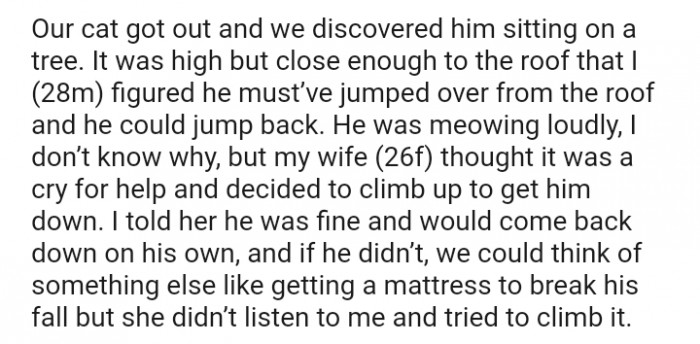
The whole time I was yelling at her
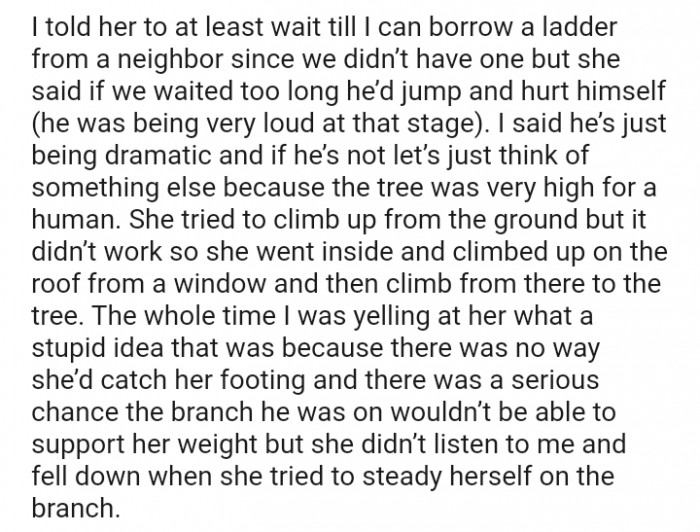
Risk-Taking Behaviors in Relationships
The wife's decision to risk her safety to save their cat from a tree can be understood through the lens of attachment theory, which posits that strong emotional bonds can lead individuals to act in ways that prioritize those attachments over personal safety. Dr. Philip Green, a clinical psychologist, explains that such risk-taking behavior often stems from an intense emotional connection, which can cloud judgment during critical moments.
Research shows that individuals with secure attachments are more likely to engage in protective behaviors, reflecting a deep sense of responsibility and care for their loved ones, including pets.
The Psychological Impact of Risk-Taking Behavior
Dr. Thomas Green, a clinical psychologist, explains that risk-taking behaviors, like climbing trees to rescue pets, often stem from strong emotional connections. People may engage in dangerous actions when motivated by love and concern for their pets, despite the inherent risks involved.
Research in behavioral psychology suggests that emotional arousal can impair judgment, leading individuals to underestimate potential dangers. Understanding this can help caregivers assess the motivations behind such actions.
The Anger Over Her Recklessness
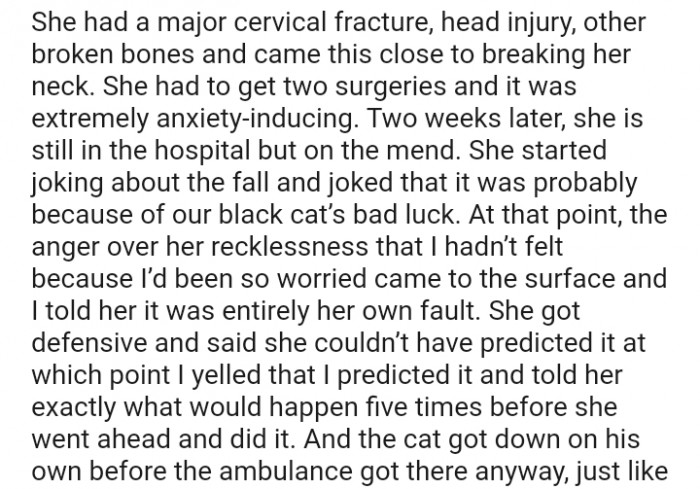
I Need to Talk This Through With Her
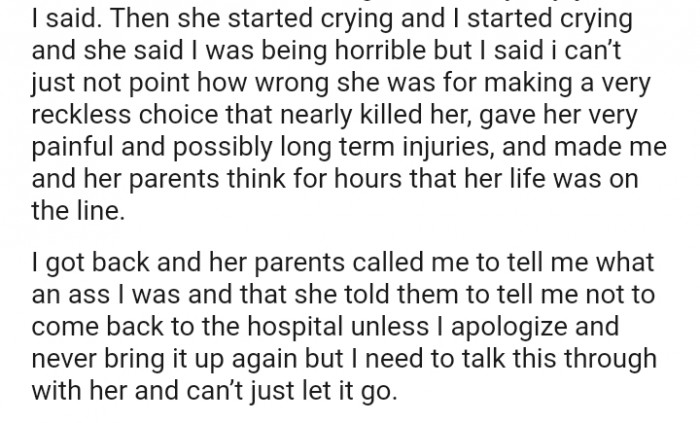
The Reddit thread received 1.8K comments with over 4K upvotes. Redditors were divided in their opinions, as some understood the OP while others felt he was an @**hole for yelling, as it doesn't solve anything.
Here are some of the top comments below.
1. She Learned Nothing From the Experience

Moreover, the situation exemplifies the concept of 'cognitive dissonance,' where the husband may experience internal conflict as he grapples with his wife's actions and his feelings of anger or concern. Studies suggest that cognitive dissonance often leads to psychological discomfort, prompting individuals to either change their attitudes or rationalize their feelings about a situation.
Understanding this dynamic can help couples navigate conflicts by fostering discussions that address both emotional responses and practical concerns.
A psychologist specializing in decision-making notes that individuals often face a conflict between rational thought and emotional impulses in high-stress situations. The urge to protect a loved one can lead to decisions that seem irrational, especially when safety is compromised.
Studies show that during times of crisis, the brain prioritizes emotional responses, which can cloud judgment. This highlights the importance of understanding the psychological processes at play during these moments.
2. Humor is a Coping Mechanism
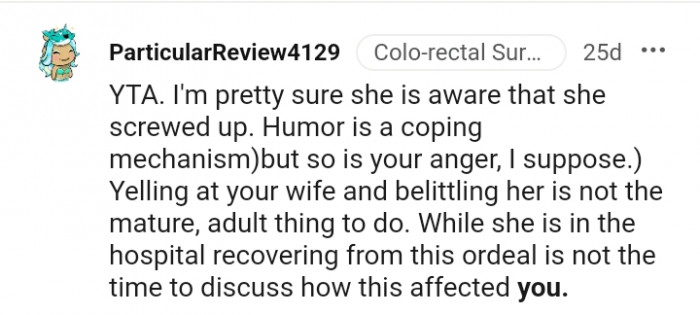
3. There Doesn't Seem to Be a Shred of Remorse

4. Why Would You Scream in a Hospital?

The Role of Anxiety in Decision-Making
High-stress situations, such as the cat being stuck in a tree, can also trigger anxiety responses that influence decision-making. Dr. Rachel Adams, a stress psychologist, points out that when individuals are faced with perceived threats, their bodies enter a heightened state of alertness, often leading to impulsive actions.
Research indicates that anxiety can impair logical reasoning, making it difficult for individuals to weigh the risks versus benefits of their actions. This highlights the importance of managing anxiety in high-stress scenarios to promote more balanced decision-making.
Navigating Anxiety and Stress in High-Stakes Situations
Research indicates that high-stress scenarios can lead to heightened anxiety, which may further influence decision-making processes. In this case, the anxiety linked to the potential loss of a pet can lead individuals to act impulsively, prioritizing immediate action over careful consideration.
Understanding the role of anxiety can help caregivers develop strategies to cope with similar situations. For example, practicing mindfulness techniques can enhance emotional regulation during stressful times.
5. Yelling Doesn't Fix or Improve Anything

6. I Don't Think You Needed to Yell

7. Yelling is a Normal Human Reaction to Recklessness

To address these challenges, couples can benefit from developing shared strategies for managing high-stress situations. Engaging in regular discussions about emotional triggers and stress responses can foster a deeper understanding of each other's perspectives, ultimately leading to more effective problem-solving.
Additionally, practicing mindfulness techniques can help both partners remain calm during stressful moments, allowing for clearer communication and more thoughtful decision-making.
Behavioral specialists suggest that individuals should assess their risk tolerance before engaging in potentially dangerous actions. Developing a clear understanding of personal limits can prevent unnecessary risks and promote safer decision-making.
Research shows that individuals who engage in reflective practices are more likely to make balanced choices, especially in emotional situations. This self-awareness can lead to better outcomes for both the individual and their pets.
8. What the OP's Wife Almost Did

9. Did She Have to Joke About It?

10. She Should Apologize for Not Listening to You

The Importance of Communication in Pet Care
Effective communication is crucial in situations involving pet care, particularly when safety is at stake. Establishing clear lines of communication between partners or family members can prevent misunderstandings and promote cooperative decision-making.
According to studies in family psychology, open discussions about responsibilities and expectations can enhance family dynamics and lead to better outcomes in stressful situations.
12. She's an Adult, and You Can't Put Her in a Bubble
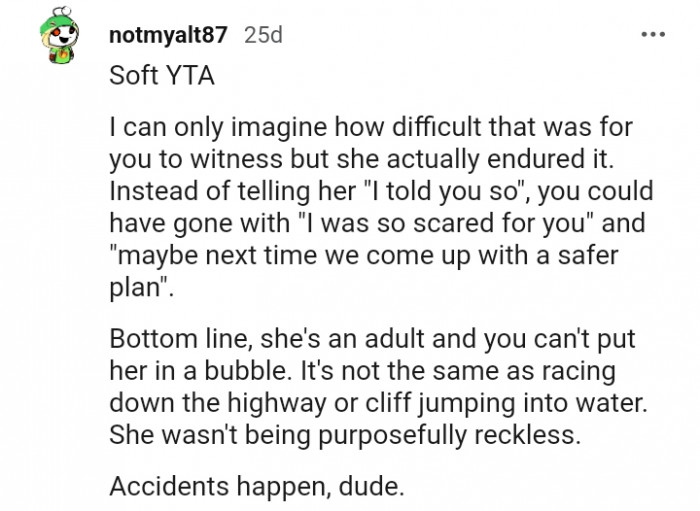
13. It's Probably a Thing Everywhere

14. This Redditor Thinks That It's a Selfish Act
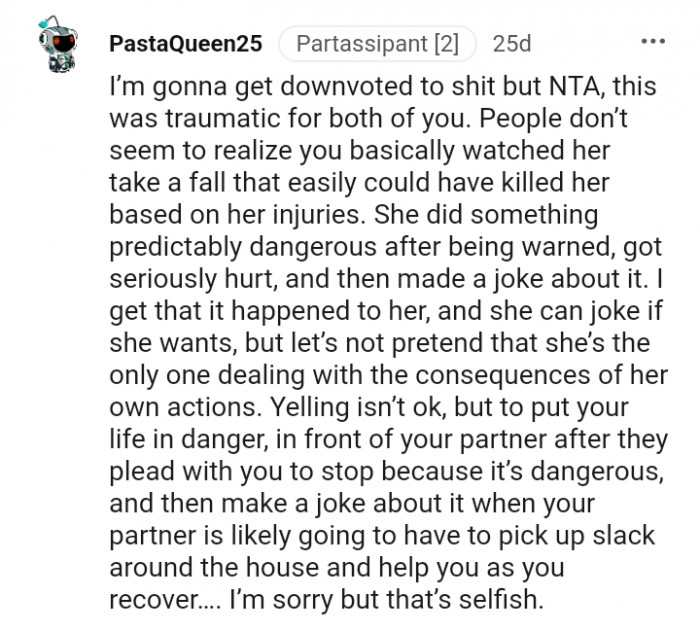
Additionally, fostering a supportive environment where individuals feel comfortable expressing their concerns can enhance emotional well-being. Encouraging open dialogue about fears and responsibilities can improve relationships and lead to healthier decision-making processes.
Research indicates that supportive communication networks contribute to resilience and better coping strategies during crises.
14. You Probably Should Have Let It Go

15. She Almost Died While Being Reckless

16. This is Something You Need to Work Through Together

Building Resilience Through Reflection
The psychological concept of resilience highlights the ability to bounce back from difficult situations. In the context of pet care, fostering resilience can help individuals better cope with the stress associated with caring for animals.
Research shows that engaging in reflective practices, such as journaling or meditation, can enhance resilience and emotional regulation, ultimately benefiting both the caregiver and the pet.
17. You Freaked Out, but Yelling Isn't Okay

18. She Was Incredibly Reckless

19. She's Had Some Extremely Traumatic Injuries

Encouraging individuals to reflect on their experiences can lead to valuable insights and lessons learned. This self-awareness can help prevent future impulsive decisions and promote healthier relationships with pets.
Incorporating resilience-building activities into daily routines can foster a more balanced approach to pet care and decision-making.
20. Your Wife Did Something Very Foolish

You’ve read the story and have also seen what the Redditors had to say, so you be the judge. Was the OP’s wife not reckless in the decision she made?
What if that action had caused her death? Could she not see that the OP was clearly worried about her?
Why couldn’t she consider other options rather than risking her life? Drop all your replies in the comments below.
Psychological Analysis
This situation highlights the intense emotional connections people have with their pets and the lengths they will go to protect them. It's essential to recognize that while these actions stem from love, they can also lead to dangerous situations. Encouraging reflective practices can help individuals make more balanced decisions in the future.
Analysis generated by AI
Analysis & Alternative Approaches
In conclusion, understanding the psychological factors that influence decision-making in high-stress situations is essential for promoting safer and more thoughtful actions. By fostering open communication and resilience, caregivers can navigate the challenges of pet ownership more effectively.
Ultimately, enhancing emotional regulation and self-awareness can lead to more positive outcomes for both pets and their owners.
Analysis & Alternative Approaches
In summary, the dynamics of risk-taking behavior in relationships, especially when influenced by emotional attachment and anxiety, present complex challenges. Research supports the idea that fostering open communication and managing stress can enhance relationship quality and decision-making processes. By understanding the psychological factors at play, couples can navigate conflicts more effectively and create a supportive environment for each other.



